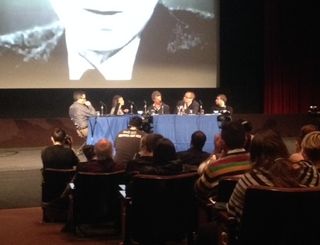Transforming Hollywood: DeBevoise - Television Is No Longer a Television

Los Angeles —The television industry has evolved in recent years and that evolution is just beginning, according to panelists at Transforming Hollywood 5: The Future of Television on Friday.
Television is not just a device in the living room with content that is dictated by companies anymore, said Allen DeBevoise, chairman of Machinima.
DeBevoise's remarks came during the first panel of the conference at the University of California, Los Angeles.
“Today we live in a world where there are all sorts of ways to watch this content on a number of devices all over,” he said. “And it has created programming that would have never been conceived to ever work in the traditional model.”
Machinima, for example, is specifically geared toward males between the ages of 18 and 34, a demographic that is particularly difficult for traditional networks to reach.
DeBevoise added that the ability to have programs on demand, to view content on multiple devices, and to interact with the growing fan culture have all contributed to television’s transformation.
With content on demand, viewers can binge watch series, which opens up the types of stories that can be told.
Broadcasting & Cable Newsletter
The smarter way to stay on top of broadcasting and cable industry. Sign up below
“When the platform changes, the product changes as well,” said Joe Lewis, head of original comedy programming at Amazon Studios, explaining that creators can tell longer stories and dive deeper into characters with binge viewing.
Lewis’ comments came during the event’s second panel, which specifically looked at cord cutting.
Jamie Byrne, director of content strategy at YouTube, echoed Lewis’ sentiments.
“The things that work really well on YouTube, might not work really well on Netflix,” said Byrne, specifically citing House of Cards as a series that might not work if you couldn’t watch it all at once.
The digital space also allows the audience to connect with each other and the shows themselves in a way TV alone can’t.
Amazon Studios is taking that one step further, inviting viewers to submit their own shows for development, said Lewis.
“We’re viewers, users, audience,” he said. “It’s all the same thing. Anyone, at least with respect to our platform, can get a show on have the same chance that Gary Trudeau or Jill Soloway or Chris Carter or anyone else.”
Monetizing those shows in this new landscape, though, is a challenge.
DeBevoise noted during the first panel that Machinima uses the leverage the shows have from their respective audiences to build revenue.
TV networks still base much of their funding on ratings.
“At the end of the day ratings are the measure by which we drive revenue,” said Vicky Free, chief marketing officer at BET, when asked how social media influences the network’s decisions on shows during the conference’s third panel.
Stacey Lynn Schulman, senior VP, chief research officer, Television Bureau of Advertising, agreed with Free, saying
“I think the measurement is really the key to whether or not content, being whether it’s online or mobile and VOD or whatever. If we can’t measure it, we can’t monetize it.”
But Ivan Askwith, the lead strategist for the Veronica Mars Kickstarter campaign, disagreed.
“I think there are starting to be ways that you can monetize but you can’t measure,” he said. “But you can’t monetize what you can’t measure if you’re business model is advertising and ad support.”
Transforming Hollywood, formerly known as Transmedia, Hollywood, is presented by the Andrew J. Kuehn Jr. Foundation and jointly created by the UCLA School of Theater, Film and Television, USC Annenberg School for Communication & Journalism and USC School of Cinematic Arts.
Jessika is an analyst for TVREV and Fabric Media. She previously served in various roles at Broadcasting + Cable, Multichannel News and NextTV, working with the brands since 2013. A graduate of USC Annenberg, Jessika has edited and reported on a variety of subjects in the media and entertainment space, including profiles on industry leaders and breaking news.

